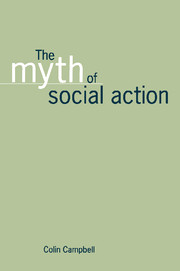Book contents
- Frontmatter
- Contents
- 1 Introduction
- 2 Action reported missing in action theory
- 3 Action and social action
- 4 Action versus social action
- 5 The rise of social situationalism
- 6 The argument by denial
- 7 Accounts and actions
- 8 The argument by exclusion
- 9 The argument through incorporation
- 10 The ‘learning everything from others’ thesis
- 11 The communicative act paradigm
- 12 The linguistic turn for the worse
- 13 The myth of social action
- 14 The obstacle which is social situationalism
- 15 Epilogue: bringing action back in
- Notes
- Bibliography
- Index
4 - Action versus social action
Published online by Cambridge University Press: 07 May 2010
- Frontmatter
- Contents
- 1 Introduction
- 2 Action reported missing in action theory
- 3 Action and social action
- 4 Action versus social action
- 5 The rise of social situationalism
- 6 The argument by denial
- 7 Accounts and actions
- 8 The argument by exclusion
- 9 The argument through incorporation
- 10 The ‘learning everything from others’ thesis
- 11 The communicative act paradigm
- 12 The linguistic turn for the worse
- 13 The myth of social action
- 14 The obstacle which is social situationalism
- 15 Epilogue: bringing action back in
- Notes
- Bibliography
- Index
Summary
The ‘social action perspective’ is an imperialist power within contemporary sociology. It has not simply displaced traditional ‘action theory’. It is fundamentally inimical to it. The recent rise to prominence of the social action perspective is the sole and direct cause of the decline of Weberian action theory. Unless its power and influence are reduced – which depends, in effect, upon broad exposure of its many deficiencies and fundamental weaknesses – there is little chance of revitalising the action tradition. Why is there so little awareness of the dramatic nature of this change? How is it possible for so many sociologists to believe that the modern position of social action, if not exactly identical with Weber's original action theory programme, is at least compatible with it? Indeed, the radical difference between the ‘modern’ and ‘classical’ positions gives rise to a further question. How is it that sociologists can employ a concept of social action which is independent of a more general concept of action?
One simple answer to this question is that contemporary sociologists are able to employ the concept of social action without reference to the more general concept of action because the adjective ‘social’ tends to qualify the noun ‘meaning’ rather than the noun ‘action’; that is to say, social action is the term typically used to refer to action which is regarded as possessing a social meaning rather than to action which is itself social. This is illustrated by David P. and Lynn S. Levine's definition: ‘Action … becomes social action in so far as the orientation of the act is to a socially shared meaning.’
- Type
- Chapter
- Information
- The Myth of Social Action , pp. 29 - 37Publisher: Cambridge University PressPrint publication year: 1996



